Consequences of Breach of Statutory Duties by Shadow Directors
VerifiedAdded on 2019/11/26
|10
|2387
|212
Report
AI Summary
The assignment discusses the statutory duties of directors, specifically the shadow directors Jack, Alice, and Francis in relation to Superdry Stores Ltd. The directors breached their duties by not taking decisions in the best interest of the company and failing to exercise their powers in good faith. As a result, they are liable for breaching their statutory duties under section 1317E of the Corporation Act 2001. If found guilty, ASIC can seek pecuniary penalty orders or disqualification orders against the directors.
Contribute Materials
Your contribution can guide someone’s learning journey. Share your
documents today.

Running Head: Law 1
Law
Law
Secure Best Marks with AI Grader
Need help grading? Try our AI Grader for instant feedback on your assignments.
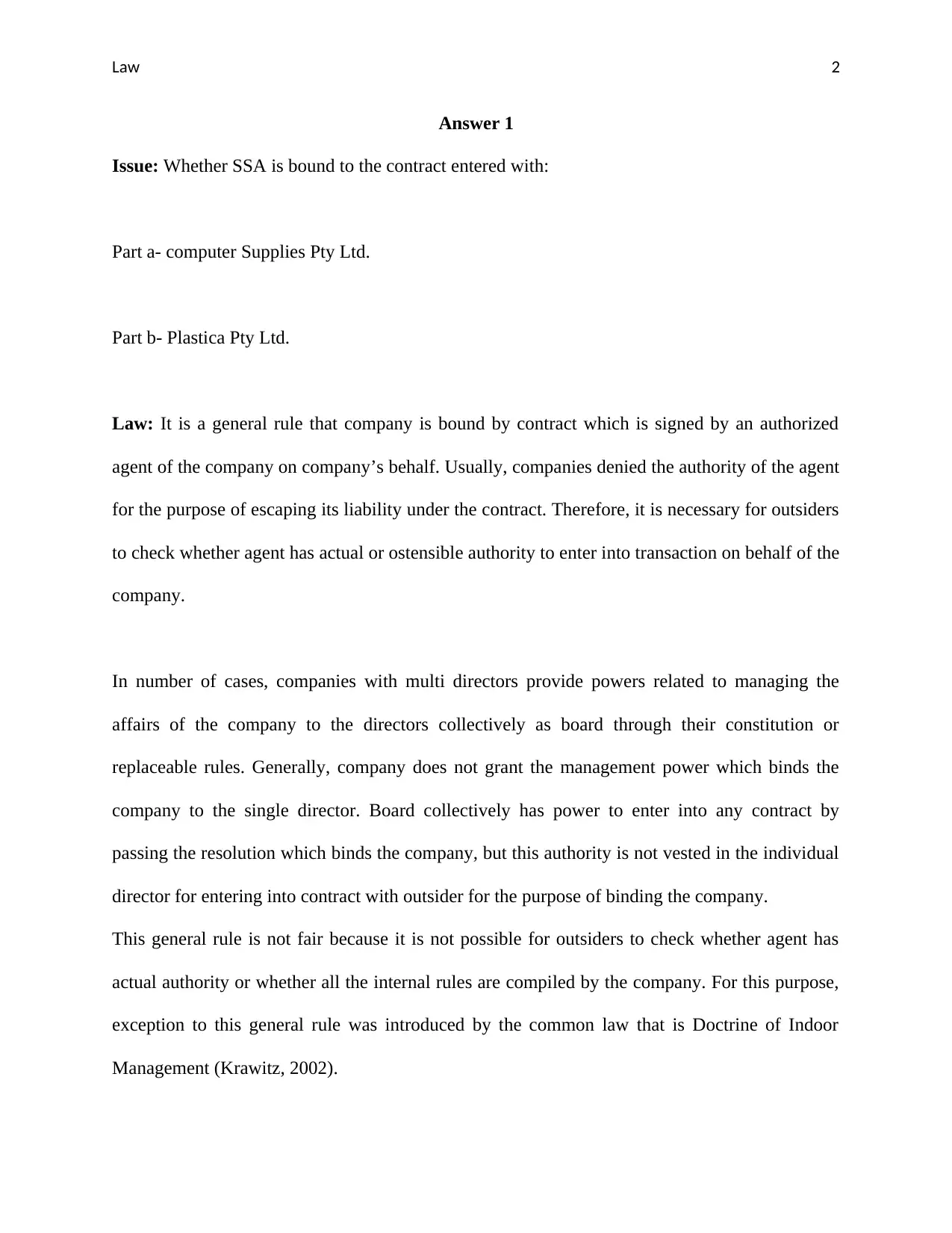
Law 2
Answer 1
Issue: Whether SSA is bound to the contract entered with:
Part a- computer Supplies Pty Ltd.
Part b- Plastica Pty Ltd.
Law: It is a general rule that company is bound by contract which is signed by an authorized
agent of the company on company’s behalf. Usually, companies denied the authority of the agent
for the purpose of escaping its liability under the contract. Therefore, it is necessary for outsiders
to check whether agent has actual or ostensible authority to enter into transaction on behalf of the
company.
In number of cases, companies with multi directors provide powers related to managing the
affairs of the company to the directors collectively as board through their constitution or
replaceable rules. Generally, company does not grant the management power which binds the
company to the single director. Board collectively has power to enter into any contract by
passing the resolution which binds the company, but this authority is not vested in the individual
director for entering into contract with outsider for the purpose of binding the company.
This general rule is not fair because it is not possible for outsiders to check whether agent has
actual authority or whether all the internal rules are compiled by the company. For this purpose,
exception to this general rule was introduced by the common law that is Doctrine of Indoor
Management (Krawitz, 2002).
Answer 1
Issue: Whether SSA is bound to the contract entered with:
Part a- computer Supplies Pty Ltd.
Part b- Plastica Pty Ltd.
Law: It is a general rule that company is bound by contract which is signed by an authorized
agent of the company on company’s behalf. Usually, companies denied the authority of the agent
for the purpose of escaping its liability under the contract. Therefore, it is necessary for outsiders
to check whether agent has actual or ostensible authority to enter into transaction on behalf of the
company.
In number of cases, companies with multi directors provide powers related to managing the
affairs of the company to the directors collectively as board through their constitution or
replaceable rules. Generally, company does not grant the management power which binds the
company to the single director. Board collectively has power to enter into any contract by
passing the resolution which binds the company, but this authority is not vested in the individual
director for entering into contract with outsider for the purpose of binding the company.
This general rule is not fair because it is not possible for outsiders to check whether agent has
actual authority or whether all the internal rules are compiled by the company. For this purpose,
exception to this general rule was introduced by the common law that is Doctrine of Indoor
Management (Krawitz, 2002).
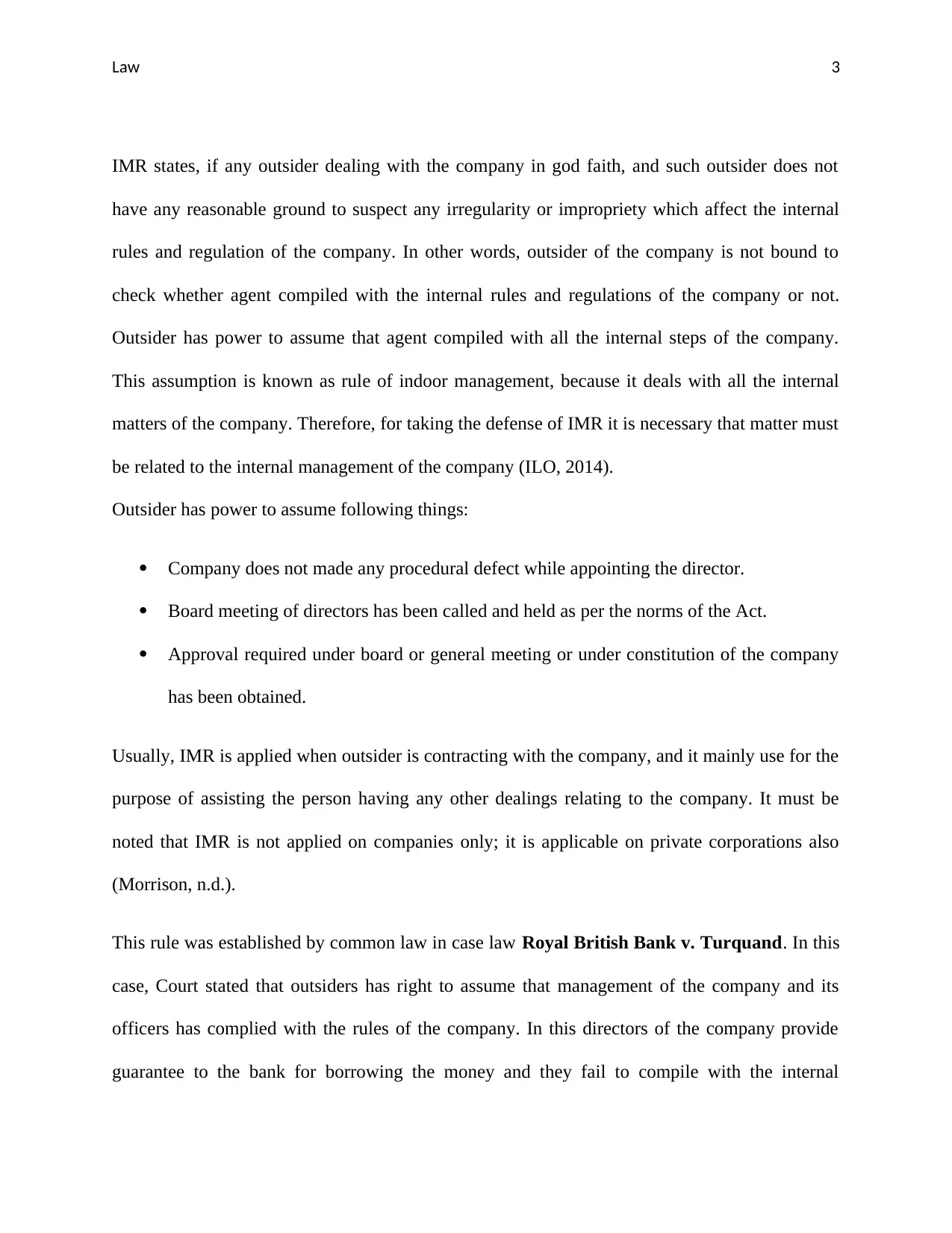
Law 3
IMR states, if any outsider dealing with the company in god faith, and such outsider does not
have any reasonable ground to suspect any irregularity or impropriety which affect the internal
rules and regulation of the company. In other words, outsider of the company is not bound to
check whether agent compiled with the internal rules and regulations of the company or not.
Outsider has power to assume that agent compiled with all the internal steps of the company.
This assumption is known as rule of indoor management, because it deals with all the internal
matters of the company. Therefore, for taking the defense of IMR it is necessary that matter must
be related to the internal management of the company (ILO, 2014).
Outsider has power to assume following things:
Company does not made any procedural defect while appointing the director.
Board meeting of directors has been called and held as per the norms of the Act.
Approval required under board or general meeting or under constitution of the company
has been obtained.
Usually, IMR is applied when outsider is contracting with the company, and it mainly use for the
purpose of assisting the person having any other dealings relating to the company. It must be
noted that IMR is not applied on companies only; it is applicable on private corporations also
(Morrison, n.d.).
This rule was established by common law in case law Royal British Bank v. Turquand. In this
case, Court stated that outsiders has right to assume that management of the company and its
officers has complied with the rules of the company. In this directors of the company provide
guarantee to the bank for borrowing the money and they fail to compile with the internal
IMR states, if any outsider dealing with the company in god faith, and such outsider does not
have any reasonable ground to suspect any irregularity or impropriety which affect the internal
rules and regulation of the company. In other words, outsider of the company is not bound to
check whether agent compiled with the internal rules and regulations of the company or not.
Outsider has power to assume that agent compiled with all the internal steps of the company.
This assumption is known as rule of indoor management, because it deals with all the internal
matters of the company. Therefore, for taking the defense of IMR it is necessary that matter must
be related to the internal management of the company (ILO, 2014).
Outsider has power to assume following things:
Company does not made any procedural defect while appointing the director.
Board meeting of directors has been called and held as per the norms of the Act.
Approval required under board or general meeting or under constitution of the company
has been obtained.
Usually, IMR is applied when outsider is contracting with the company, and it mainly use for the
purpose of assisting the person having any other dealings relating to the company. It must be
noted that IMR is not applied on companies only; it is applicable on private corporations also
(Morrison, n.d.).
This rule was established by common law in case law Royal British Bank v. Turquand. In this
case, Court stated that outsiders has right to assume that management of the company and its
officers has complied with the rules of the company. In this directors of the company provide
guarantee to the bank for borrowing the money and they fail to compile with the internal
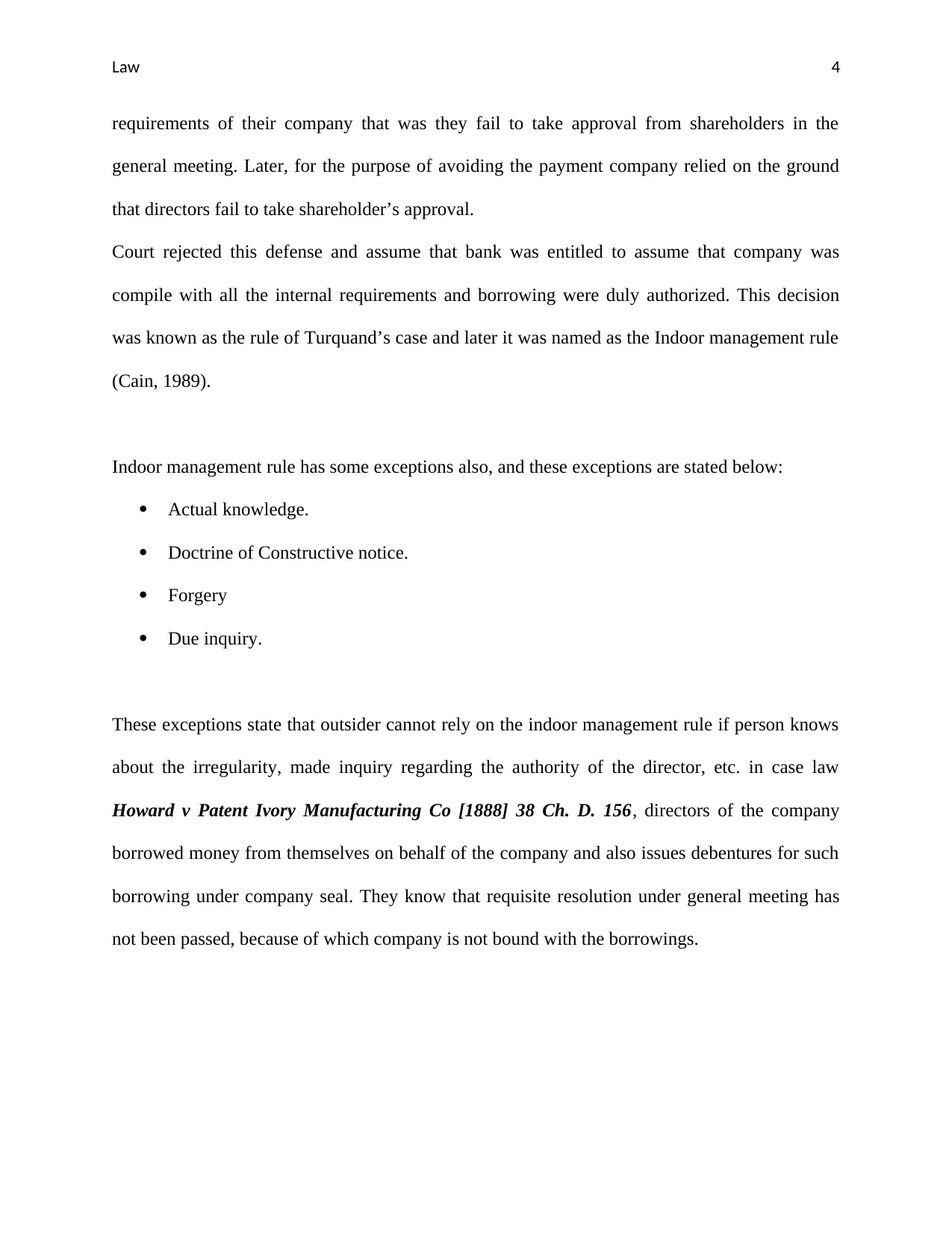
Law 4
requirements of their company that was they fail to take approval from shareholders in the
general meeting. Later, for the purpose of avoiding the payment company relied on the ground
that directors fail to take shareholder’s approval.
Court rejected this defense and assume that bank was entitled to assume that company was
compile with all the internal requirements and borrowing were duly authorized. This decision
was known as the rule of Turquand’s case and later it was named as the Indoor management rule
(Cain, 1989).
Indoor management rule has some exceptions also, and these exceptions are stated below:
Actual knowledge.
Doctrine of Constructive notice.
Forgery
Due inquiry.
These exceptions state that outsider cannot rely on the indoor management rule if person knows
about the irregularity, made inquiry regarding the authority of the director, etc. in case law
Howard v Patent Ivory Manufacturing Co [1888] 38 Ch. D. 156, directors of the company
borrowed money from themselves on behalf of the company and also issues debentures for such
borrowing under company seal. They know that requisite resolution under general meeting has
not been passed, because of which company is not bound with the borrowings.
requirements of their company that was they fail to take approval from shareholders in the
general meeting. Later, for the purpose of avoiding the payment company relied on the ground
that directors fail to take shareholder’s approval.
Court rejected this defense and assume that bank was entitled to assume that company was
compile with all the internal requirements and borrowing were duly authorized. This decision
was known as the rule of Turquand’s case and later it was named as the Indoor management rule
(Cain, 1989).
Indoor management rule has some exceptions also, and these exceptions are stated below:
Actual knowledge.
Doctrine of Constructive notice.
Forgery
Due inquiry.
These exceptions state that outsider cannot rely on the indoor management rule if person knows
about the irregularity, made inquiry regarding the authority of the director, etc. in case law
Howard v Patent Ivory Manufacturing Co [1888] 38 Ch. D. 156, directors of the company
borrowed money from themselves on behalf of the company and also issues debentures for such
borrowing under company seal. They know that requisite resolution under general meeting has
not been passed, because of which company is not bound with the borrowings.
Secure Best Marks with AI Grader
Need help grading? Try our AI Grader for instant feedback on your assignments.
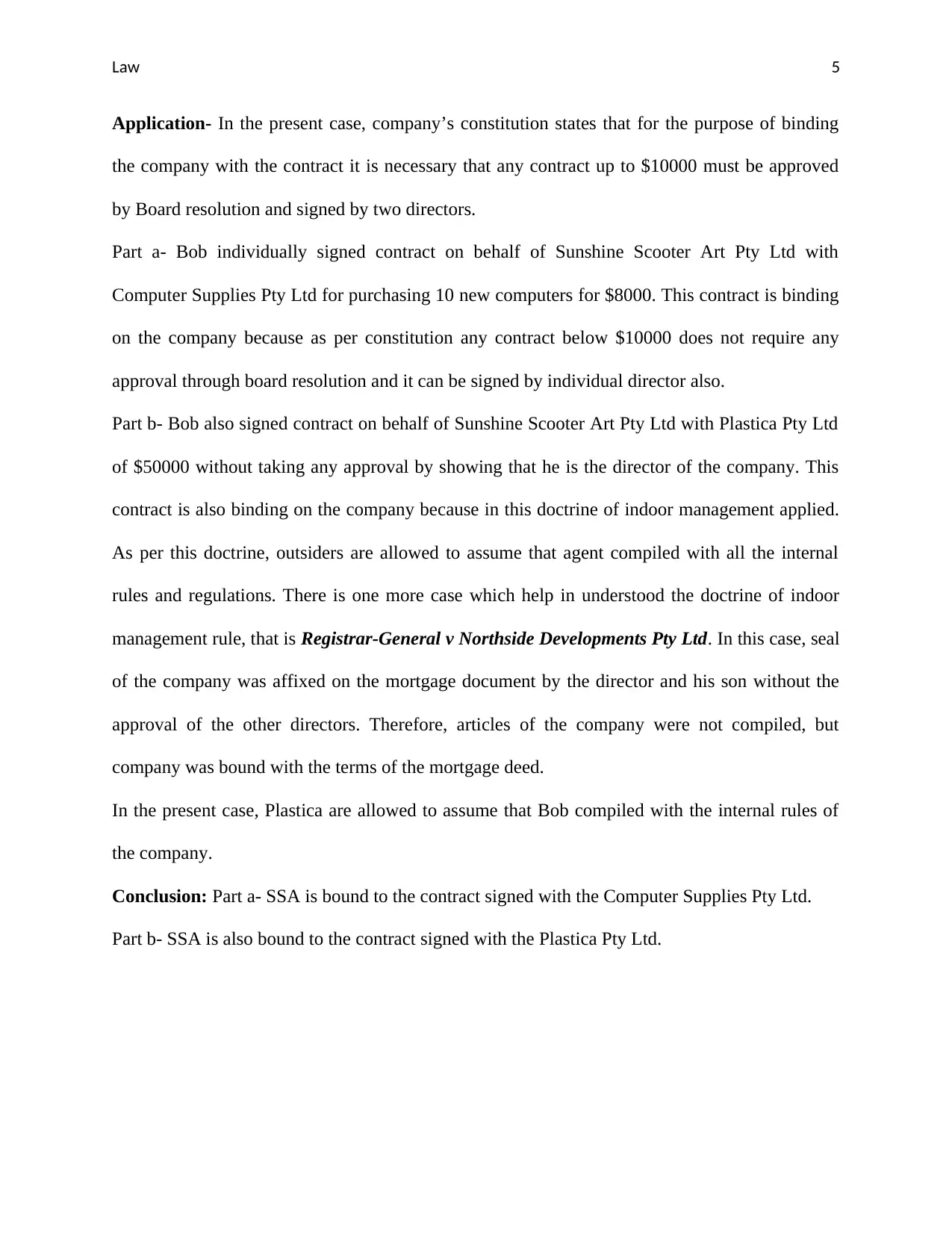
Law 5
Application- In the present case, company’s constitution states that for the purpose of binding
the company with the contract it is necessary that any contract up to $10000 must be approved
by Board resolution and signed by two directors.
Part a- Bob individually signed contract on behalf of Sunshine Scooter Art Pty Ltd with
Computer Supplies Pty Ltd for purchasing 10 new computers for $8000. This contract is binding
on the company because as per constitution any contract below $10000 does not require any
approval through board resolution and it can be signed by individual director also.
Part b- Bob also signed contract on behalf of Sunshine Scooter Art Pty Ltd with Plastica Pty Ltd
of $50000 without taking any approval by showing that he is the director of the company. This
contract is also binding on the company because in this doctrine of indoor management applied.
As per this doctrine, outsiders are allowed to assume that agent compiled with all the internal
rules and regulations. There is one more case which help in understood the doctrine of indoor
management rule, that is Registrar-General v Northside Developments Pty Ltd. In this case, seal
of the company was affixed on the mortgage document by the director and his son without the
approval of the other directors. Therefore, articles of the company were not compiled, but
company was bound with the terms of the mortgage deed.
In the present case, Plastica are allowed to assume that Bob compiled with the internal rules of
the company.
Conclusion: Part a- SSA is bound to the contract signed with the Computer Supplies Pty Ltd.
Part b- SSA is also bound to the contract signed with the Plastica Pty Ltd.
Application- In the present case, company’s constitution states that for the purpose of binding
the company with the contract it is necessary that any contract up to $10000 must be approved
by Board resolution and signed by two directors.
Part a- Bob individually signed contract on behalf of Sunshine Scooter Art Pty Ltd with
Computer Supplies Pty Ltd for purchasing 10 new computers for $8000. This contract is binding
on the company because as per constitution any contract below $10000 does not require any
approval through board resolution and it can be signed by individual director also.
Part b- Bob also signed contract on behalf of Sunshine Scooter Art Pty Ltd with Plastica Pty Ltd
of $50000 without taking any approval by showing that he is the director of the company. This
contract is also binding on the company because in this doctrine of indoor management applied.
As per this doctrine, outsiders are allowed to assume that agent compiled with all the internal
rules and regulations. There is one more case which help in understood the doctrine of indoor
management rule, that is Registrar-General v Northside Developments Pty Ltd. In this case, seal
of the company was affixed on the mortgage document by the director and his son without the
approval of the other directors. Therefore, articles of the company were not compiled, but
company was bound with the terms of the mortgage deed.
In the present case, Plastica are allowed to assume that Bob compiled with the internal rules of
the company.
Conclusion: Part a- SSA is bound to the contract signed with the Computer Supplies Pty Ltd.
Part b- SSA is also bound to the contract signed with the Plastica Pty Ltd.
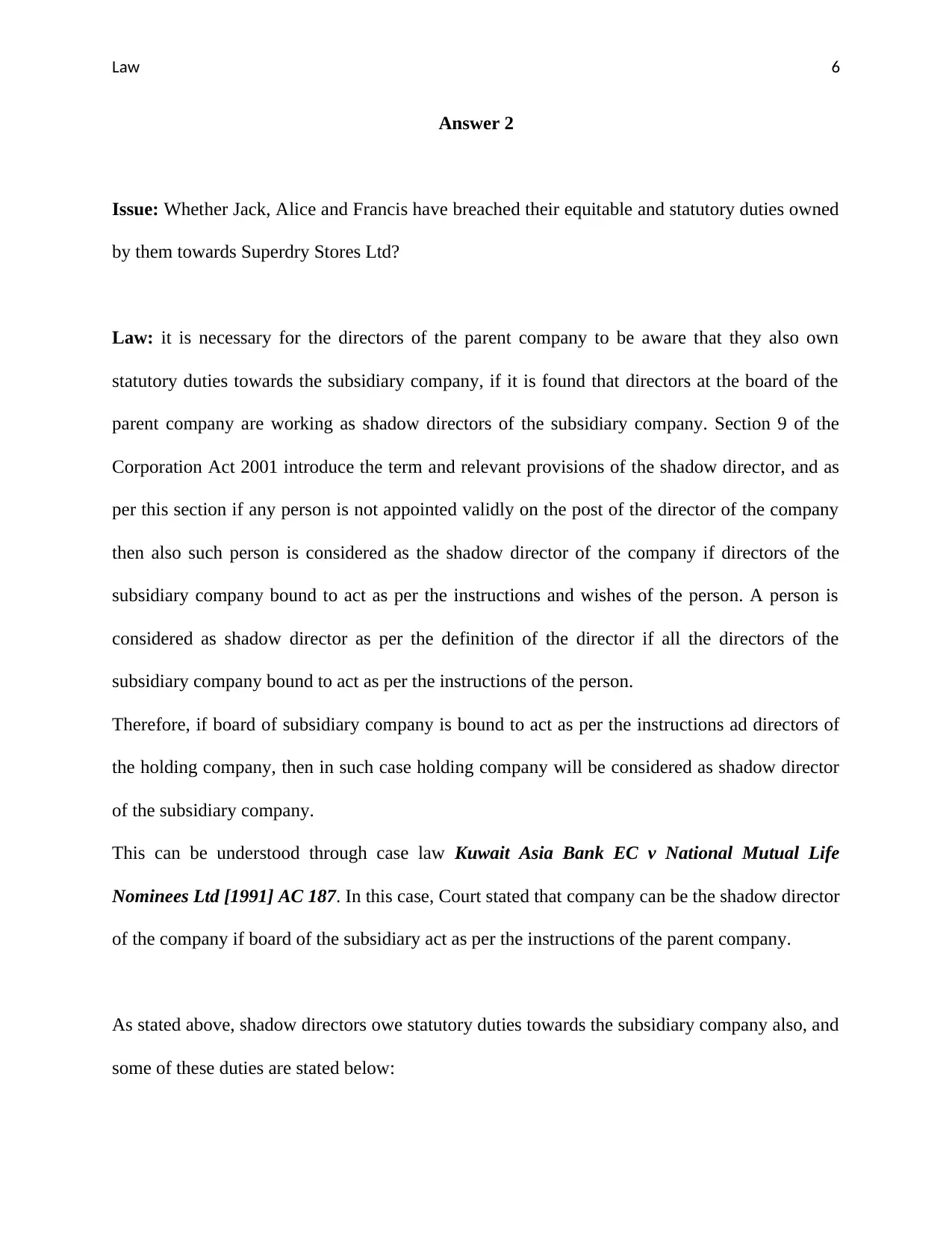
Law 6
Answer 2
Issue: Whether Jack, Alice and Francis have breached their equitable and statutory duties owned
by them towards Superdry Stores Ltd?
Law: it is necessary for the directors of the parent company to be aware that they also own
statutory duties towards the subsidiary company, if it is found that directors at the board of the
parent company are working as shadow directors of the subsidiary company. Section 9 of the
Corporation Act 2001 introduce the term and relevant provisions of the shadow director, and as
per this section if any person is not appointed validly on the post of the director of the company
then also such person is considered as the shadow director of the company if directors of the
subsidiary company bound to act as per the instructions and wishes of the person. A person is
considered as shadow director as per the definition of the director if all the directors of the
subsidiary company bound to act as per the instructions of the person.
Therefore, if board of subsidiary company is bound to act as per the instructions ad directors of
the holding company, then in such case holding company will be considered as shadow director
of the subsidiary company.
This can be understood through case law Kuwait Asia Bank EC v National Mutual Life
Nominees Ltd [1991] AC 187. In this case, Court stated that company can be the shadow director
of the company if board of the subsidiary act as per the instructions of the parent company.
As stated above, shadow directors owe statutory duties towards the subsidiary company also, and
some of these duties are stated below:
Answer 2
Issue: Whether Jack, Alice and Francis have breached their equitable and statutory duties owned
by them towards Superdry Stores Ltd?
Law: it is necessary for the directors of the parent company to be aware that they also own
statutory duties towards the subsidiary company, if it is found that directors at the board of the
parent company are working as shadow directors of the subsidiary company. Section 9 of the
Corporation Act 2001 introduce the term and relevant provisions of the shadow director, and as
per this section if any person is not appointed validly on the post of the director of the company
then also such person is considered as the shadow director of the company if directors of the
subsidiary company bound to act as per the instructions and wishes of the person. A person is
considered as shadow director as per the definition of the director if all the directors of the
subsidiary company bound to act as per the instructions of the person.
Therefore, if board of subsidiary company is bound to act as per the instructions ad directors of
the holding company, then in such case holding company will be considered as shadow director
of the subsidiary company.
This can be understood through case law Kuwait Asia Bank EC v National Mutual Life
Nominees Ltd [1991] AC 187. In this case, Court stated that company can be the shadow director
of the company if board of the subsidiary act as per the instructions of the parent company.
As stated above, shadow directors owe statutory duties towards the subsidiary company also, and
some of these duties are stated below:
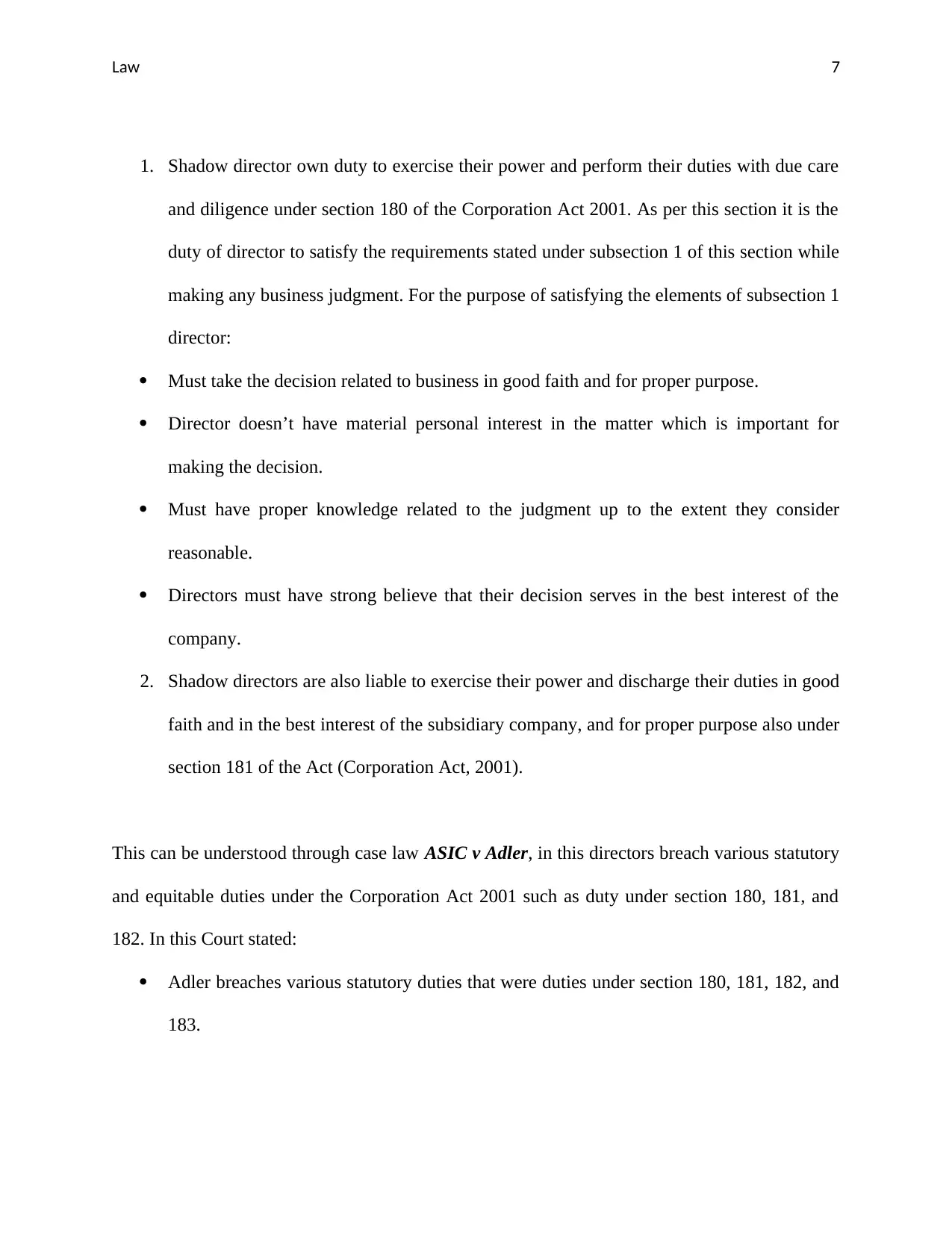
Law 7
1. Shadow director own duty to exercise their power and perform their duties with due care
and diligence under section 180 of the Corporation Act 2001. As per this section it is the
duty of director to satisfy the requirements stated under subsection 1 of this section while
making any business judgment. For the purpose of satisfying the elements of subsection 1
director:
Must take the decision related to business in good faith and for proper purpose.
Director doesn’t have material personal interest in the matter which is important for
making the decision.
Must have proper knowledge related to the judgment up to the extent they consider
reasonable.
Directors must have strong believe that their decision serves in the best interest of the
company.
2. Shadow directors are also liable to exercise their power and discharge their duties in good
faith and in the best interest of the subsidiary company, and for proper purpose also under
section 181 of the Act (Corporation Act, 2001).
This can be understood through case law ASIC v Adler, in this directors breach various statutory
and equitable duties under the Corporation Act 2001 such as duty under section 180, 181, and
182. In this Court stated:
Adler breaches various statutory duties that were duties under section 180, 181, 182, and
183.
1. Shadow director own duty to exercise their power and perform their duties with due care
and diligence under section 180 of the Corporation Act 2001. As per this section it is the
duty of director to satisfy the requirements stated under subsection 1 of this section while
making any business judgment. For the purpose of satisfying the elements of subsection 1
director:
Must take the decision related to business in good faith and for proper purpose.
Director doesn’t have material personal interest in the matter which is important for
making the decision.
Must have proper knowledge related to the judgment up to the extent they consider
reasonable.
Directors must have strong believe that their decision serves in the best interest of the
company.
2. Shadow directors are also liable to exercise their power and discharge their duties in good
faith and in the best interest of the subsidiary company, and for proper purpose also under
section 181 of the Act (Corporation Act, 2001).
This can be understood through case law ASIC v Adler, in this directors breach various statutory
and equitable duties under the Corporation Act 2001 such as duty under section 180, 181, and
182. In this Court stated:
Adler breaches various statutory duties that were duties under section 180, 181, 182, and
183.
Paraphrase This Document
Need a fresh take? Get an instant paraphrase of this document with our AI Paraphraser
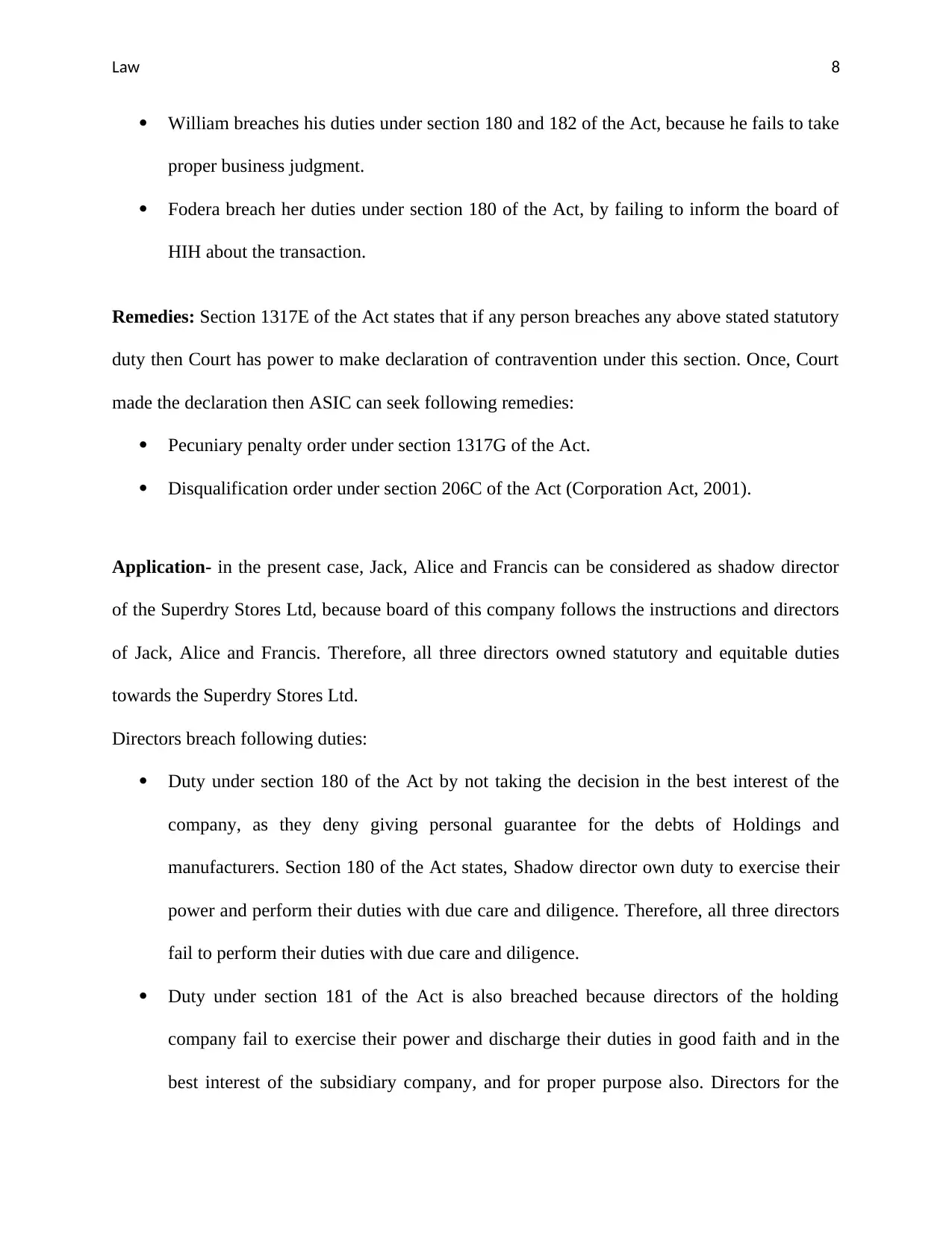
Law 8
William breaches his duties under section 180 and 182 of the Act, because he fails to take
proper business judgment.
Fodera breach her duties under section 180 of the Act, by failing to inform the board of
HIH about the transaction.
Remedies: Section 1317E of the Act states that if any person breaches any above stated statutory
duty then Court has power to make declaration of contravention under this section. Once, Court
made the declaration then ASIC can seek following remedies:
Pecuniary penalty order under section 1317G of the Act.
Disqualification order under section 206C of the Act (Corporation Act, 2001).
Application- in the present case, Jack, Alice and Francis can be considered as shadow director
of the Superdry Stores Ltd, because board of this company follows the instructions and directors
of Jack, Alice and Francis. Therefore, all three directors owned statutory and equitable duties
towards the Superdry Stores Ltd.
Directors breach following duties:
Duty under section 180 of the Act by not taking the decision in the best interest of the
company, as they deny giving personal guarantee for the debts of Holdings and
manufacturers. Section 180 of the Act states, Shadow director own duty to exercise their
power and perform their duties with due care and diligence. Therefore, all three directors
fail to perform their duties with due care and diligence.
Duty under section 181 of the Act is also breached because directors of the holding
company fail to exercise their power and discharge their duties in good faith and in the
best interest of the subsidiary company, and for proper purpose also. Directors for the
William breaches his duties under section 180 and 182 of the Act, because he fails to take
proper business judgment.
Fodera breach her duties under section 180 of the Act, by failing to inform the board of
HIH about the transaction.
Remedies: Section 1317E of the Act states that if any person breaches any above stated statutory
duty then Court has power to make declaration of contravention under this section. Once, Court
made the declaration then ASIC can seek following remedies:
Pecuniary penalty order under section 1317G of the Act.
Disqualification order under section 206C of the Act (Corporation Act, 2001).
Application- in the present case, Jack, Alice and Francis can be considered as shadow director
of the Superdry Stores Ltd, because board of this company follows the instructions and directors
of Jack, Alice and Francis. Therefore, all three directors owned statutory and equitable duties
towards the Superdry Stores Ltd.
Directors breach following duties:
Duty under section 180 of the Act by not taking the decision in the best interest of the
company, as they deny giving personal guarantee for the debts of Holdings and
manufacturers. Section 180 of the Act states, Shadow director own duty to exercise their
power and perform their duties with due care and diligence. Therefore, all three directors
fail to perform their duties with due care and diligence.
Duty under section 181 of the Act is also breached because directors of the holding
company fail to exercise their power and discharge their duties in good faith and in the
best interest of the subsidiary company, and for proper purpose also. Directors for the
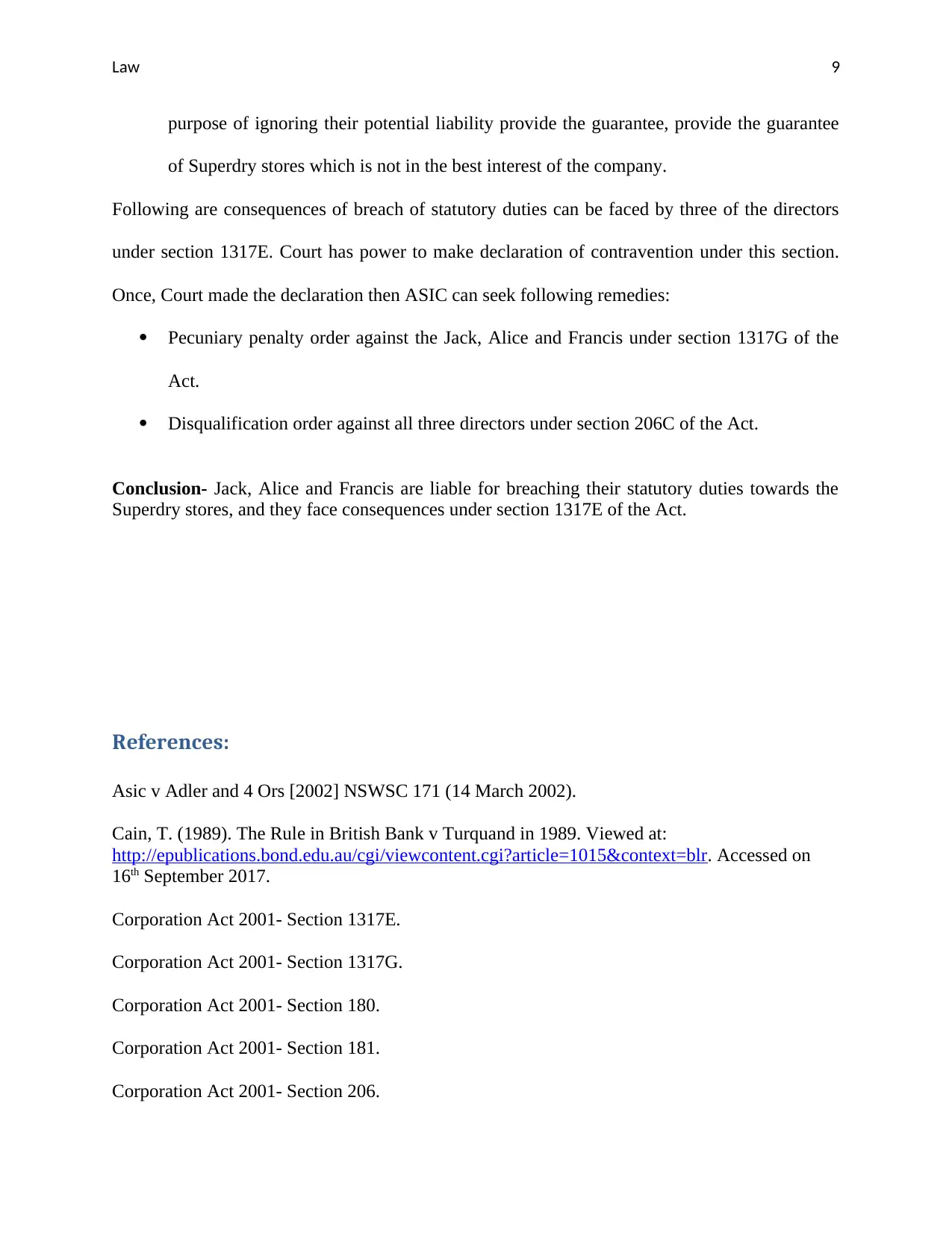
Law 9
purpose of ignoring their potential liability provide the guarantee, provide the guarantee
of Superdry stores which is not in the best interest of the company.
Following are consequences of breach of statutory duties can be faced by three of the directors
under section 1317E. Court has power to make declaration of contravention under this section.
Once, Court made the declaration then ASIC can seek following remedies:
Pecuniary penalty order against the Jack, Alice and Francis under section 1317G of the
Act.
Disqualification order against all three directors under section 206C of the Act.
Conclusion- Jack, Alice and Francis are liable for breaching their statutory duties towards the
Superdry stores, and they face consequences under section 1317E of the Act.
References:
Asic v Adler and 4 Ors [2002] NSWSC 171 (14 March 2002).
Cain, T. (1989). The Rule in British Bank v Turquand in 1989. Viewed at:
http://epublications.bond.edu.au/cgi/viewcontent.cgi?article=1015&context=blr. Accessed on
16th September 2017.
Corporation Act 2001- Section 1317E.
Corporation Act 2001- Section 1317G.
Corporation Act 2001- Section 180.
Corporation Act 2001- Section 181.
Corporation Act 2001- Section 206.
purpose of ignoring their potential liability provide the guarantee, provide the guarantee
of Superdry stores which is not in the best interest of the company.
Following are consequences of breach of statutory duties can be faced by three of the directors
under section 1317E. Court has power to make declaration of contravention under this section.
Once, Court made the declaration then ASIC can seek following remedies:
Pecuniary penalty order against the Jack, Alice and Francis under section 1317G of the
Act.
Disqualification order against all three directors under section 206C of the Act.
Conclusion- Jack, Alice and Francis are liable for breaching their statutory duties towards the
Superdry stores, and they face consequences under section 1317E of the Act.
References:
Asic v Adler and 4 Ors [2002] NSWSC 171 (14 March 2002).
Cain, T. (1989). The Rule in British Bank v Turquand in 1989. Viewed at:
http://epublications.bond.edu.au/cgi/viewcontent.cgi?article=1015&context=blr. Accessed on
16th September 2017.
Corporation Act 2001- Section 1317E.
Corporation Act 2001- Section 1317G.
Corporation Act 2001- Section 180.
Corporation Act 2001- Section 181.
Corporation Act 2001- Section 206.
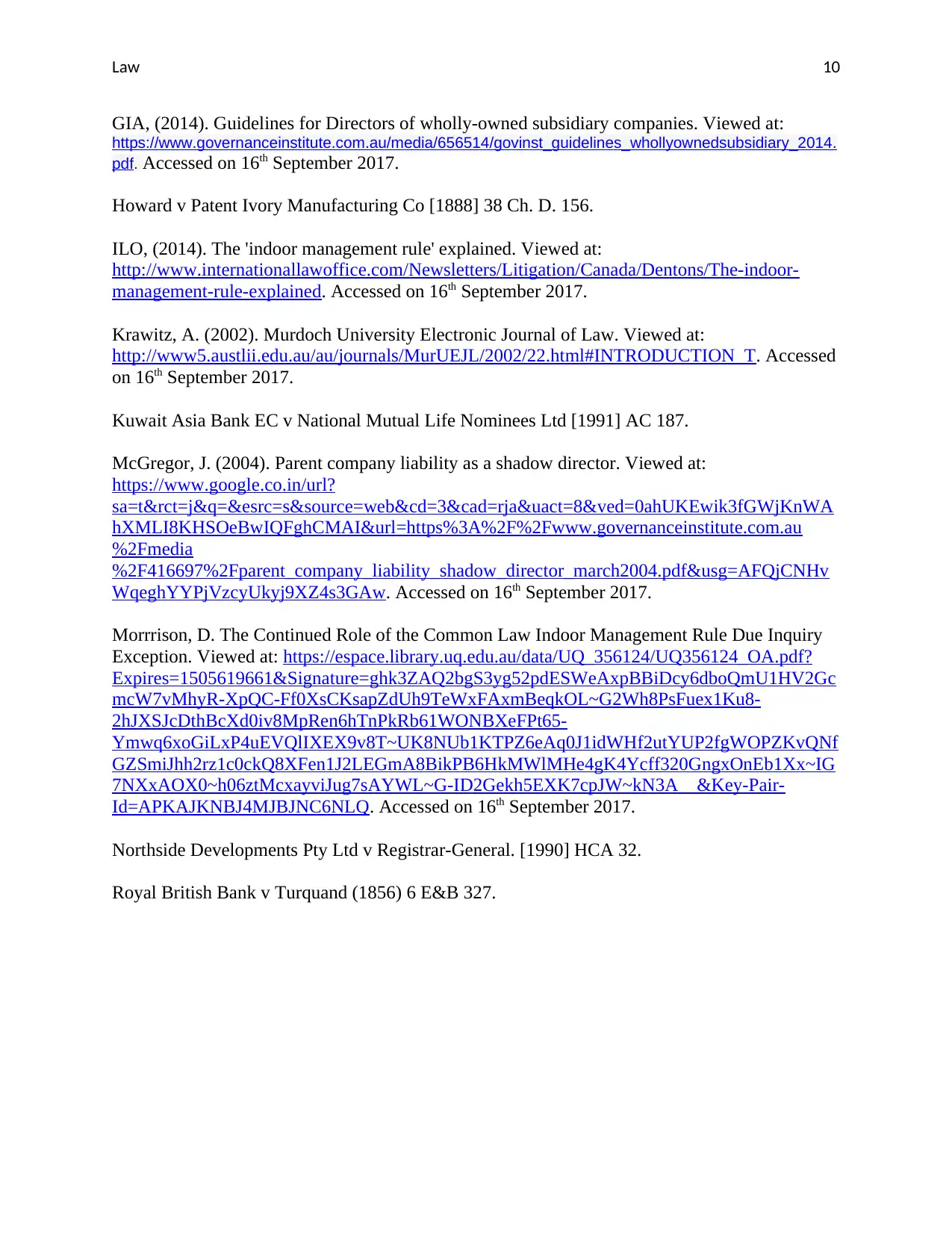
Law 10
GIA, (2014). Guidelines for Directors of wholly-owned subsidiary companies. Viewed at:
https://www.governanceinstitute.com.au/media/656514/govinst_guidelines_whollyownedsubsidiary_2014.
pdf. Accessed on 16th September 2017.
Howard v Patent Ivory Manufacturing Co [1888] 38 Ch. D. 156.
ILO, (2014). The 'indoor management rule' explained. Viewed at:
http://www.internationallawoffice.com/Newsletters/Litigation/Canada/Dentons/The-indoor-
management-rule-explained. Accessed on 16th September 2017.
Krawitz, A. (2002). Murdoch University Electronic Journal of Law. Viewed at:
http://www5.austlii.edu.au/au/journals/MurUEJL/2002/22.html#INTRODUCTION_T. Accessed
on 16th September 2017.
Kuwait Asia Bank EC v National Mutual Life Nominees Ltd [1991] AC 187.
McGregor, J. (2004). Parent company liability as a shadow director. Viewed at:
https://www.google.co.in/url?
sa=t&rct=j&q=&esrc=s&source=web&cd=3&cad=rja&uact=8&ved=0ahUKEwik3fGWjKnWA
hXMLI8KHSOeBwIQFghCMAI&url=https%3A%2F%2Fwww.governanceinstitute.com.au
%2Fmedia
%2F416697%2Fparent_company_liability_shadow_director_march2004.pdf&usg=AFQjCNHv
WqeghYYPjVzcyUkyj9XZ4s3GAw. Accessed on 16th September 2017.
Morrrison, D. The Continued Role of the Common Law Indoor Management Rule Due Inquiry
Exception. Viewed at: https://espace.library.uq.edu.au/data/UQ_356124/UQ356124_OA.pdf?
Expires=1505619661&Signature=ghk3ZAQ2bgS3yg52pdESWeAxpBBiDcy6dboQmU1HV2Gc
mcW7vMhyR-XpQC-Ff0XsCKsapZdUh9TeWxFAxmBeqkOL~G2Wh8PsFuex1Ku8-
2hJXSJcDthBcXd0iv8MpRen6hTnPkRb61WONBXeFPt65-
Ymwq6xoGiLxP4uEVQlIXEX9v8T~UK8NUb1KTPZ6eAq0J1idWHf2utYUP2fgWOPZKvQNf
GZSmiJhh2rz1c0ckQ8XFen1J2LEGmA8BikPB6HkMWlMHe4gK4Ycff320GngxOnEb1Xx~IG
7NXxAOX0~h06ztMcxayviJug7sAYWL~G-ID2Gekh5EXK7cpJW~kN3A__&Key-Pair-
Id=APKAJKNBJ4MJBJNC6NLQ. Accessed on 16th September 2017.
Northside Developments Pty Ltd v Registrar-General. [1990] HCA 32.
Royal British Bank v Turquand (1856) 6 E&B 327.
GIA, (2014). Guidelines for Directors of wholly-owned subsidiary companies. Viewed at:
https://www.governanceinstitute.com.au/media/656514/govinst_guidelines_whollyownedsubsidiary_2014.
pdf. Accessed on 16th September 2017.
Howard v Patent Ivory Manufacturing Co [1888] 38 Ch. D. 156.
ILO, (2014). The 'indoor management rule' explained. Viewed at:
http://www.internationallawoffice.com/Newsletters/Litigation/Canada/Dentons/The-indoor-
management-rule-explained. Accessed on 16th September 2017.
Krawitz, A. (2002). Murdoch University Electronic Journal of Law. Viewed at:
http://www5.austlii.edu.au/au/journals/MurUEJL/2002/22.html#INTRODUCTION_T. Accessed
on 16th September 2017.
Kuwait Asia Bank EC v National Mutual Life Nominees Ltd [1991] AC 187.
McGregor, J. (2004). Parent company liability as a shadow director. Viewed at:
https://www.google.co.in/url?
sa=t&rct=j&q=&esrc=s&source=web&cd=3&cad=rja&uact=8&ved=0ahUKEwik3fGWjKnWA
hXMLI8KHSOeBwIQFghCMAI&url=https%3A%2F%2Fwww.governanceinstitute.com.au
%2Fmedia
%2F416697%2Fparent_company_liability_shadow_director_march2004.pdf&usg=AFQjCNHv
WqeghYYPjVzcyUkyj9XZ4s3GAw. Accessed on 16th September 2017.
Morrrison, D. The Continued Role of the Common Law Indoor Management Rule Due Inquiry
Exception. Viewed at: https://espace.library.uq.edu.au/data/UQ_356124/UQ356124_OA.pdf?
Expires=1505619661&Signature=ghk3ZAQ2bgS3yg52pdESWeAxpBBiDcy6dboQmU1HV2Gc
mcW7vMhyR-XpQC-Ff0XsCKsapZdUh9TeWxFAxmBeqkOL~G2Wh8PsFuex1Ku8-
2hJXSJcDthBcXd0iv8MpRen6hTnPkRb61WONBXeFPt65-
Ymwq6xoGiLxP4uEVQlIXEX9v8T~UK8NUb1KTPZ6eAq0J1idWHf2utYUP2fgWOPZKvQNf
GZSmiJhh2rz1c0ckQ8XFen1J2LEGmA8BikPB6HkMWlMHe4gK4Ycff320GngxOnEb1Xx~IG
7NXxAOX0~h06ztMcxayviJug7sAYWL~G-ID2Gekh5EXK7cpJW~kN3A__&Key-Pair-
Id=APKAJKNBJ4MJBJNC6NLQ. Accessed on 16th September 2017.
Northside Developments Pty Ltd v Registrar-General. [1990] HCA 32.
Royal British Bank v Turquand (1856) 6 E&B 327.
1 out of 10
Related Documents
Your All-in-One AI-Powered Toolkit for Academic Success.
+13062052269
info@desklib.com
Available 24*7 on WhatsApp / Email
![[object Object]](/_next/static/media/star-bottom.7253800d.svg)
Unlock your academic potential
© 2024 | Zucol Services PVT LTD | All rights reserved.





